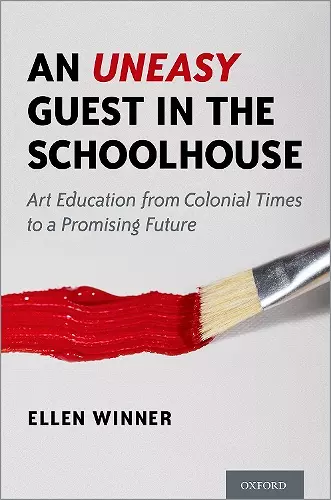An Uneasy Guest in the Schoolhouse
Art Education from Colonial Times to a Promising Future
Format:Hardback
Publisher:Oxford University Press Inc
Published:13th Apr '22
Currently unavailable, and unfortunately no date known when it will be back

An Uneasy Guest in the Schoolhouse recounts how art education has been conceptualized, taught, and advocated for in the United States in the face of its persistent marginalization in the education system. Tracing various rationales offered from the 19th century onward, Winner argues that art education has failed to be justified as a good in and of itself--and this failure has affected both the status of visual art education in our schools and the quality of its teaching. Winner's comprehensive book maps recurrent pendulum swings between "traditional" and "progressive" approaches to art education in the United States, supplemented by her firsthand experiences observing art teaching in schools in China and Italy. Despite this problematic and uncertain past, 21st century art education in the United States and abroad has exploded with a wealth of new ideas aligned with the progressivism of the early 20th century and informed by the practices of contemporary art. As Winner details, an understanding of the history of art education, along with a focus on current challenges and opportunities, is essential for arts researchers, educators, and advocates, as well as anyone in the general public who cares about quality education in the 21st century.
What Uneasy Guest does is lay out, chronologically, how art education has progressed in the United States, beginning with 19th century art classes as a way to encourage "moral and social utility" in young students and moving through progressivism in the 1940s, the quick failed move into disciplined based art education in the 1960s, extreme utilitarianism of the 1980s and 1990s (where we still hear echoes strongly today), and into possible futures for the arts in schools. She contrasts authentic art goals versus subservient arts integration and asks whether art class is a sanctuary or whether it is an integrated part of a whole educational system. * Thalia R. Goldstein, Psychology of Aesthetics, Creativity, and the Arts *
The theme that unifies Winner's engaging book is that the arts must be recognized for their intrinsic value. Winner documents the ways in which the arts in schools have worked hard to be accepted as more than just adjuncts to the "academic" or practical disciplines. She traces this trajectory from the late 18th century to the fractious present. Warm endorsements from a number of prominent scholars in art education underline this author's special contributions to scholarship in the field. * David Pariser, International Journal of Education & the Arts *
Ellen Winner offers a striking history of the vicissitudes of art education in the US: its oscillation between laissez-faire art-making and discipline-based instruction, as well as its growing efforts to nurture the mental habits and practices of authentic artistic engagement among children in today's schools. Both teachers and artists will be fascinated and inspired by her narrative. * Paul Harris, Harvard University *
If you are a student of art education-or anyone interested in the history of ideas and practices in education--this is the book for you. * Julia Marshall, Professor Emeritus of Art Education, San Francisco State University *
Why has art education remained on the margins of American schooling? Drawing on her lifelong interest in the arts, a family heritage from Progressive education, and research expertise honed at Harvard Project Zero, Ellen Winner deftly traces two conflicting approaches to art education and identifies key principles that will advance the arts from the sidelines of schooling to the center. * Mary Ann Stankiewicz, Emerita Professor of Art Education, Pennsylvania State University *
Ellen Winner has created a very personal chronicle reflecting upon the evolution of art education that is very different from others. The connections and discord observed in various pedagogies around the wolrd creates a backdrop for reflection that frames her unique representation of the evolution of American Art education. * Douglas G. Boughton, Professor of Art and Design Education, Northern Illinois University *
The book by Prof. Ellen Winner is one of the most passionate, complete and engaging on art education, and to her goes my gratitude. The experience of the infant-toddler centres and preschools in Reggio Emilia and the research about the role of art and expressive languages in learning processes they carried out find here a full and courageous interpretation. * Carla Rinaldi, President, Reggio Children Foundation *
ISBN: 9780190061289
Dimensions: 165mm x 244mm x 33mm
Weight: 454g
216 pages